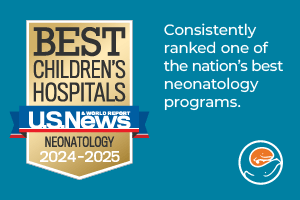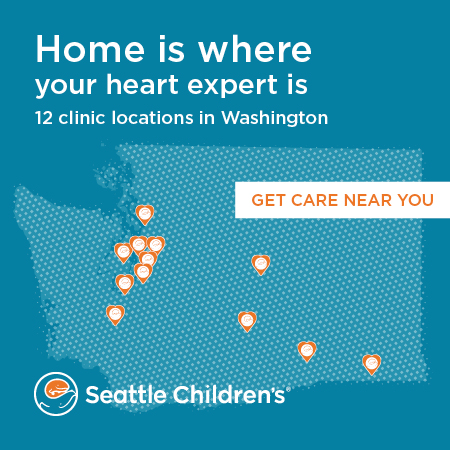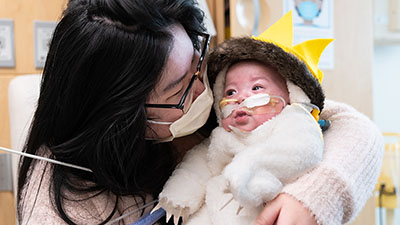Birth Asphyxia (Hypoxic-Ischemic Encephalopathy)
What is birth asphyxia (hypoxic-ischemic encephalopathy)?
Asphyxia (as-FIX-ee-uh) means lack of oxygen and blood flow to the brain. Birth asphyxia happens when a baby’s brain and other organs do not get enough oxygen and nutrients before, during or right after birth. Without oxygen and nutrients, cells cannot work properly. This damages brain cells. Some cells may recover, but sometimes the damage is permanent.
The medical name for this condition is hypoxic-ischemic encephalopathy (hi-POX-ik-is-KEE-mik in-seh-fuh-LAH-puh-thee) or HIE. It also is called perinatal asphyxia or acute neonatal encephalopathy.
The amount of harm depends on:
- How long your baby does not get enough oxygen
- How quickly a baby gets the right treatment
-
Do babies recover from birth asphyxia (HIE)?
Babies with mild or moderate HIE may recover fully. If the cells did not get enough oxygen for a longer time, a baby may have permanent injury. This could affect their brain, heart, lungs, kidneys or other organs. In the most severe cases, asphyxia can lead to organ failure and death.
At this time, whole-body cooling (therapeutic hypothermia) is the only treatment that can improve outcomes for babies born after 35 weeks’ gestation who have moderate or severe HIE.
-
Stages of HIE
Two stages of injury can happen with HIE:
- The first stage happens within minutes if blood flow is low and cells do not get enough oxygen.
- The second stage is called “reperfusion injury.” It can last for days or even weeks. After the brain starts getting normal levels of blood and oxygen, the damaged cells release chemicals that cause harm.
-
What causes birth asphyxia (HIE)?
Some causes include:
- The separating from the womb too soon
- Problems related to the womb during labor or the during delivery
- Very long or difficult delivery
- The baby gets stuck during delivery
- Large amounts of blood loss during labor or delivery
Neonatology at Seattle Children's
What are the symptoms of birth asphyxia (HIE)?
Symptoms of asphyxia at the time of birth may include:
- Not breathing or very weak breathing
- Skin color that is bluish, gray or lighter than normal
- Low heart rate
- Poor muscle tone
- Weak reflexes
- Too much acid in the blood (acidosis)
- Seizures
In the delivery room, some babies need help to breathe and maintain a heartbeat (called resuscitation).
How is birth asphyxia (HIE) diagnosed?
At birth, doctors and nurses check your baby carefully and rate their condition from 0 to 10. This number is called an Apgar score. The Apgar score rates skin color, heart rate, muscle tone, reflexes and breathing effort. A very low Apgar score (0 to 5) lasting longer than 10 minutes may be a sign of hypoxic-ischemic encephalopathy.
Your doctor will look for signs of a high level of acid in the blood, which can mean your baby had low oxygen and blood flow. To check, your care team will take a sample of your baby’s blood or cord blood at the time of birth or soon after.
Your doctor will also examine your baby for signs of abnormal brain function. If abnormal, your baby might be treated with whole-body cooling (hypothermia).
How is birth asphyxia (HIE) treated?
Your baby’s care will happen in our Level IV Neonatal Intensive Care Unit (NICU), with a team trained and equipped to care for the most critically ill newborns. Babies with HIE receive care from Seattle Children’s neonatal neurocritical (Neuro NICU) care team of experts in brain injury in babies.
Hospitals in our region refer babies to Seattle Children’s for the specialized care that only we provide. Our region includes Washington, Alaska, Montana and Idaho (WAMI).
-
Whole-body cooling (hypothermia)
To date, the only treatment for hypoxic-ischemic encephalopathy is “whole-body hypothermia.” It is also called “cooling therapy.” Seattle Children’s has some of the nation’s best outcomes for babies treated with whole-body cooling.
Research shows that cooling a baby’s internal body temperature to 33.5°C (about 91°F) for 72 hours can help protect their brain from damage during the second stage of asphyxia. This stage (reperfusion) is when normal blood flow and oxygen are restored to the brain. Starting this treatment within 6 hours after birth has the best results. We use this treatment for babies at least 35 weeks’ gestation (not more than 5 weeks early).
Often, we can start cooling therapy during transport to our hospital to make sure your baby gets the best care as soon as possible. Seattle Children’s is a “high-volume” cooling center, which means we have a lot of experience caring for babies affected by HIE. Learn more about therapeutic hypothermia (PDF).
-
Neuro NICU
The Neuro NICU is a team of internationally recognized and experts who specialize in caring for newborns with brain injury. Dr. Ulrike Mietzsch (neonatology) and Dr. Niranjana Natarajan (neurology) lead the team. They will work closely with other members of your care team, using advanced technology to monitor and treat your baby. We also have a team of specialized and who help your baby recover.
About 30% of babies with HIE have 1 or more during the first few days of life. Seizures in newborns (PDF) can happen without any outward signs. We monitor all babies with an EEG (electroencephalography) during cooling therapy so we can quickly detect seizures and provide treatment.
HIE can affect any organ and how it functions. The doctor will check your baby for other signs of a lack of blood flow or oxygen. These include:
- Abnormal breathing
- Abnormal oxygen levels
- Poor blood circulation
- Low blood pressure
- Not peeing
- Blood-clotting abnormalities
- Abnormal levels of glucose (a type of sugar) and in the blood
Babies with more serious asphyxia may need additional support. Possible treatments include:
- Breathing support from a machine (ventilator).
- High-frequency ventilation: A special breathing machine that sends small, rapid puffs of air into your child’s lungs.
- Inhaled nitric oxide (iNO): A gas that is inhaled through a breathing tube. This specialized treatment helps the blood vessels in the lungs to take up more oxygen.
- A heart-lung pump for life support if your baby’s heart or lungs are not working well or need time to heal. This is called extracorporeal membrane oxygenation (ECMO) or extracorporeal life support (ECLS).
- Medicine to control blood pressure.
- Transfusions of blood products to help with or abnormal blood clotting.
- Kidney support with to filter their blood.
- Medicine to treat .
- nutrition to give their body time to heal.
Follow-Up Treatment for Birth Asphyxia (HIE)
After your child receives any urgent or emergency treatment they need, the team at Seattle Children’s gives ongoing care so your child has the best possible outcome. We evaluate all your child’s health needs and work with you to create a care plan that fits your child and family.
Babies who did not get enough oxygen during birth are at risk for long-term effects. Some affected children may develop mild to severe degrees of:
- Cerebral palsy
- Problems with speech
- Problems with or behavior including attention deficit hyperactivity disorder (ADHD) and autism
- Hearing problems
- Eyesight problems
Catching problems early and getting a referral to specialists may improve outcomes for your child. We will refer your baby to a clinic that specializes in care for children who had hypoxic-ischemic encephalopathy.
All babies affected by HIE will have their first developmental follow-up visit in our Neuro NICU clinic or the Infant Development Follow-Up Clinic (IDFC) at UW Medicine at around 3 to 4 months of age. Following the first visit, your baby will be seen for assessments at 6 to 9 months, 12 months, 18 months and 24 months.
Learn more about developmental follow-up.
How will Seattle Children’s make a difference for my baby?
 Your baby will be in the hands of newborn care experts who are very experienced in treating babies with HIE. Our Neonatal Intensive Care Unit (NICU) is designated level IV — which means we provide the highest level of care possible for very ill newborns. Some of our treatments are offered nowhere else in the Northwest.
Your baby will be in the hands of newborn care experts who are very experienced in treating babies with HIE. Our Neonatal Intensive Care Unit (NICU) is designated level IV — which means we provide the highest level of care possible for very ill newborns. Some of our treatments are offered nowhere else in the Northwest.
Seattle Children’s is the only Level IV NICU in our region that has a specialized and Neonatal Neurocritical Care (Neuro NICU) team. Our WAMI region includes Washington, Alaska, Montana and Idaho.
Our advanced treatments and services include whole-body cooling (hypothermia) to reduce the risk of brain injury, state-of-the-art breathing support, life support (ECLS or ECMO), and advanced diagnostic methods.
Our neonatal transport team of doctors, nurses and respiratory therapists are national leaders in safely moving fragile newborns.
At Seattle Children’s, you are a key member of your baby’s healthcare team. Together, we work to give your child the best quality of life, not just meet their medical needs.
-
National research leaders
Our are internationally known for their work to protect and heal the brains of babies who did not get enough oxygen at birth. We are committed to improving treatments for babies with asphyxia so they have the best possible chance of a healthy life.
Babies in our care can take part in research studies of promising new treatments. These are called clinical trials. Current research focuses on improved treatments for HIE and the best ways to relieve pain and reduce stress in the NICU.
Seattle Children’s is the only member of the Children’s Hospital Neonatal Consortium. The group tracks quality and outcomes across Level IV NICUs to improve care for babies born very early or with complex conditions.
Learn more about Seattle Children’s research to improve newborn care.
-
Support for your whole family
- At Seattle Children’s, your family has a full team behind you. We offer a comforting environment for you and your family.
- We work with you to make decisions and treatment plans for your baby. We invite you to share your insights, questions and concerns during daily meetings of your baby’s healthcare team. The meetings are called “rounds.” Consultations are available to help you sort through confusing or difficult medical issues.
- We work with families from around the Northwest and beyond. We can help with financial counseling, housing, transportation, interpreter services and spiritual care. Our goal is to get you and your baby home — or back to a hospital close to home — as soon as possible.
Contact Us
- For more information about Neonatology, contact us at 206-987-2675.
- If your baby is in our NICU and you need to reach a nurse, call 206-987-2041.
- See information and services for families of newborn and premature babies.
Providers
- If you need neonatal emergency transport, call 206-987-5437 (KIDS).
- See how to transfer a patient.
Paying for Care
Learn about paying for care at Seattle Children’s, including insurance coverage, billing and financial assistance.


